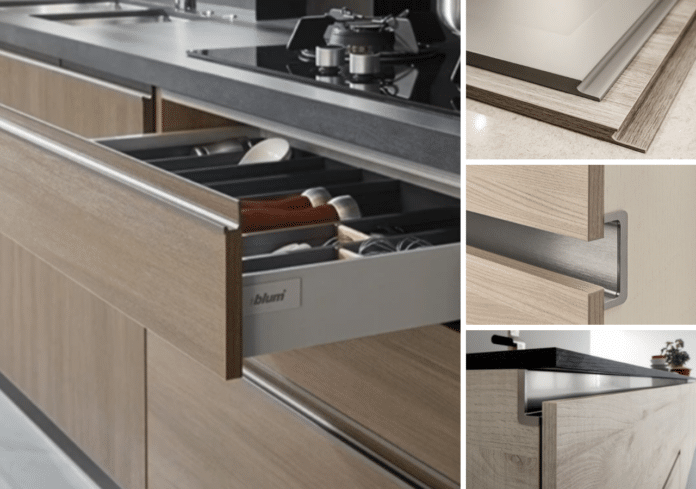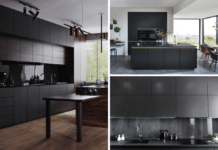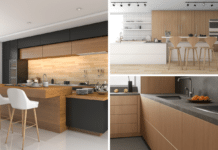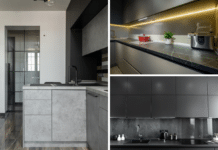Handleless kitchen cabinets have quickly become a hallmark in today’s interior design landscape.
The sleek, minimalist, and functional appeal of handleless cabinetry has gained immense popularity among homeowners who favor modern and contemporary kitchen designs. It offers homeowners a stylish alternative to traditional cabinet door styles.
This article will explore everything you need to know about handleless kitchen cabinets to see if they are the right choice for your home. Let’s dive right in.
What are Handleless Kitchen Cabinets
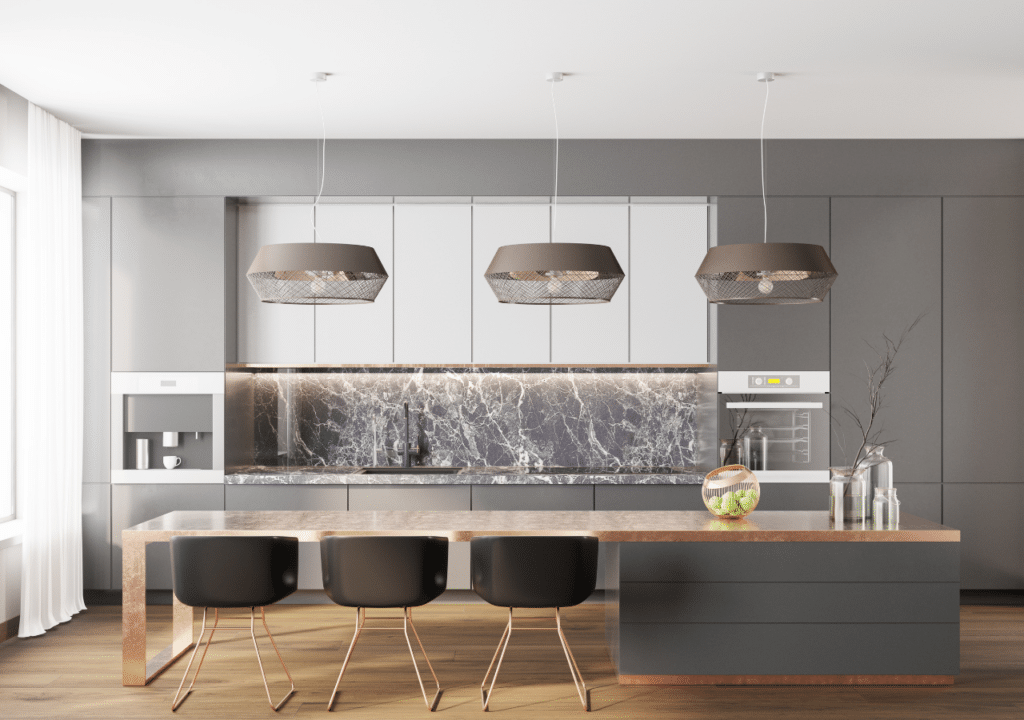
Despite the name of the design, handleless cabinets in high-end kitchens use certain systems and mechanisms in place of handles.
To put it simply, handleless kitchen cabinets do not mean they do not have handles at all. Instead of traditional knobs or pulls, they use an alternative door mechanism that allows a user to open and close the cabinet doors and drawer fronts with visible handles.
These mechanisms include recessed channels, push-to-open technology, and integrated handles cut into the cabinet doors. These integrated door mechanism results in a smooth, uninterrupted cabinet surface that highlights clean lines and minimalism.
Handleless kitchen cabinets tend to be more expensive than standard cabinets due to their specialized mechanisms and design, with an average cost per linear foot ranging from $200 to $1500 more for installed handleless cabinets.
Yet, prices may still vary depending on the material, customization, and geographical location.
Benefits of Handleless Kitchen Cabinets
Here are some of the practical reasons why you should choose handleless kitchen design.
Sleek and Smooth Appearance
The absence of protruding hardware interrupting the cabinet surface creates a seamless, uninterrupted flow that perfectly suits modern and contemporary kitchens.
Easy Maintenance
Dust and grime accumulate over time. Yet, with no-handle kitchen cabinets, you have fewer pieces or surfaces to clean, therefore, calling for easier maintenance.
Improved Safety
A handleless cabinet design reduces the risk of clothing snagging or accidental bumps, which is especially important in small kitchens and homes with young children.
Space Efficiency
The seamless look of no-hardware kitchen cabinets eliminates visual clutter, making a kitchen feel more open and spacious.
Drawbacks of Choosing Handleless Cabinets
Just like any other kitchen design element, handleless cabinets have their own set of disadvantages.
Cost
Handleless kitchens, especially with push-to-open mechanisms, can be more costly than traditional cabinetry.
Smudge and Fingerprints
Kitchen units without handles are prone to surface fingerprints and smudging. They tend to show marks left behind, as there are no visible handles to hold, and you directly touch the door surface to open the cabinet.
Matte black and glossy white finishes are more prone to showing fingerprint marks.
Less Practical
Although handleless cabinets look sleek, some homeowners don’t find them less practical to use. Some find them frustrating or less convenient, especially those with long fingernails.
Learning Curve
Some users may find the lack of handles initially awkward, requiring an adjustment period. Your guests may wonder how to open cabinets without handles.
6 Popular Door Mechanisms of Handleless Kitchen Cabinets
Over the years, advances in materials and manufacturing techniques have helped to refine the handleless kitchen design. With the advent of new materials and cutting-edge technology, homeowners have more options for creating handleless kitchen cabinets.
Today, the development of specialized mechanisms has increased the functionality of handleless cabinets.
Each of these mechanisms has its features, but all of them are suitable for handleless cabinets, so your choice will be based on your wishes and preferences.
Here are the popular mechanisms for handleless cabinets.
1. Shark Nose Finger Pull (Beveled Edge)
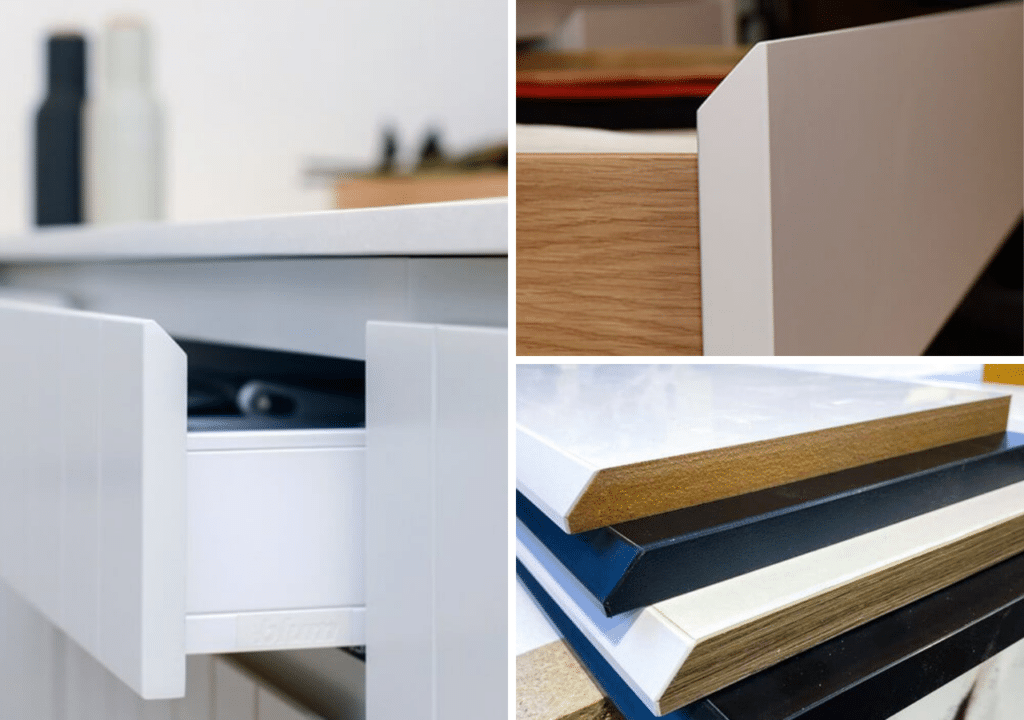
Shark nose finger pull, also known as beveled edge, has become one of the best handleless cabinet door options in today’s homes. Obviously, it got its name due to its sharp, angled nose that resembles a shark’s.
The beveled notch of this recessed handle serves as a functional cabinet door handle. It creates a special finger space that allows the kitchen cabinet to be opened and closed easily.
2. Cut-Out Recessed Handle
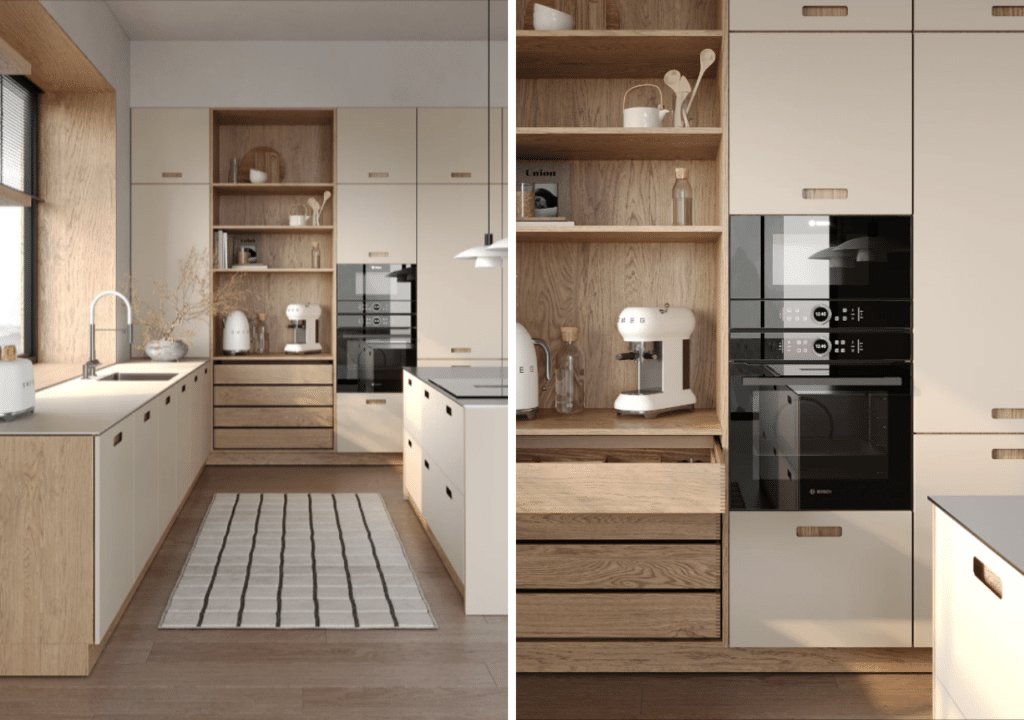
A cut-out handle is another type of recessed handle made by cutting or milling a hole or recess into the surface of the cabinets or drawers.
The cut-outs on the surface can be rectangular, semi-circular, or angular, depending on the design style. This handleless door option allows a custom look, giving a distinctive touch to the kitchen interior.
The cabinet front cut-outs can display the wood behind the cut-out handle or can be left blank. If the cut-out showcases the underlying material, a wood veneer can be placed in the middle of the door front to create a recessed handle framed by the cabinet or drawer fronts.
3. J Profile Handle
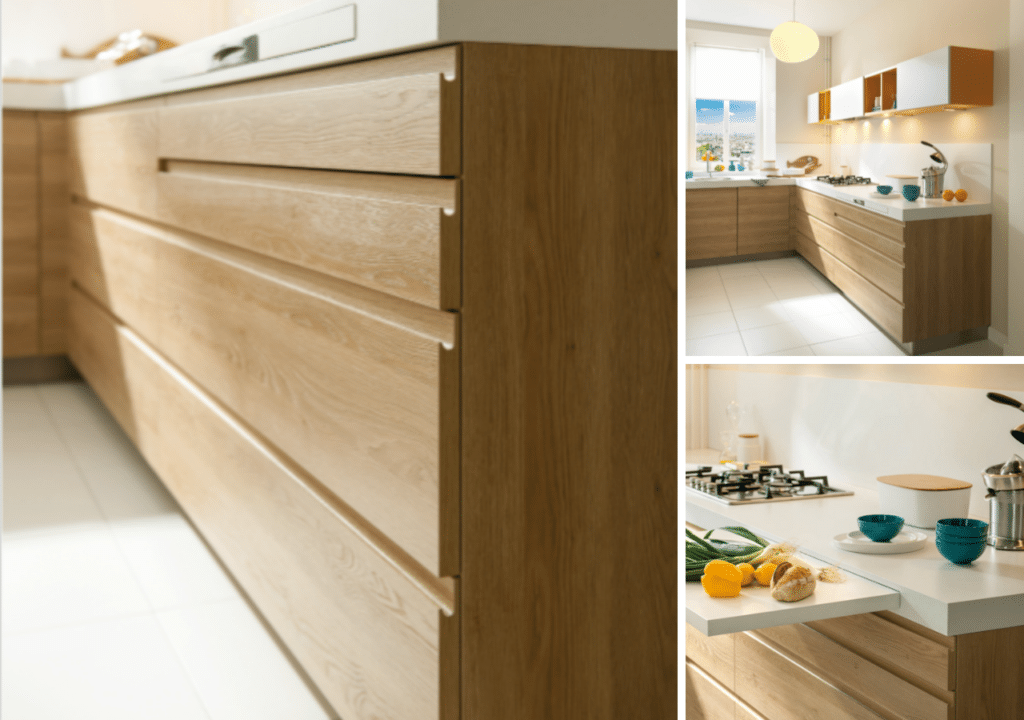
The J Profile handle is a type of recessed handle that offers the same advantages of an aesthetically minimalist look and convenient usage.
In this handleless design, J-shaped grooves are cut into the top or bottom edge of the cabinet doors and drawer fronts. This J-shaped groove allows the user to grip and pull the door or drawer open without the need for a traditional handle.
Also known as a J-pull handle, it is often paired with a soft-close mechanism that gently shuts the cabinet door. This design creates a sleek and seamless look that is perfect for modern and minimalist kitchen designs.
The handle itself isn’t very noticeable, which doesn’t disrupt the look of a handleless kitchen. You won’t have to worry about cleanliness because, once again, these are not the kind of handles that gather dust or debris.
4. Gola Profile Handleless Rail System
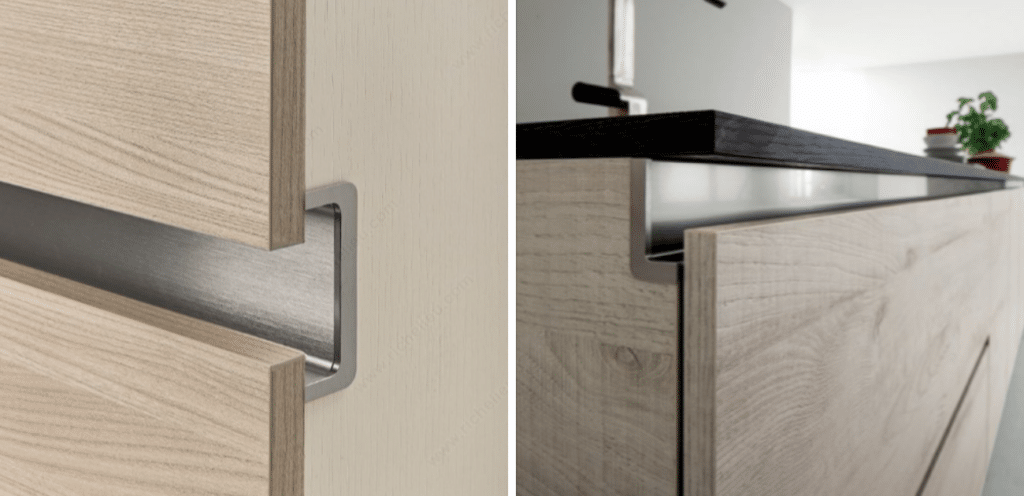
The Gola Profile handle system is a type of recessed handle that features a continuous aluminum or steel rail running behind the cabinet door, creating a finger gap to open the door fronts without any handles.
In handleless kitchen design, the Gola profile is a structural element that is often hidden in the cabinet or drawer construction to make it easier to open and close the fronts without visible handles or buttons.
5. Push-to-Open
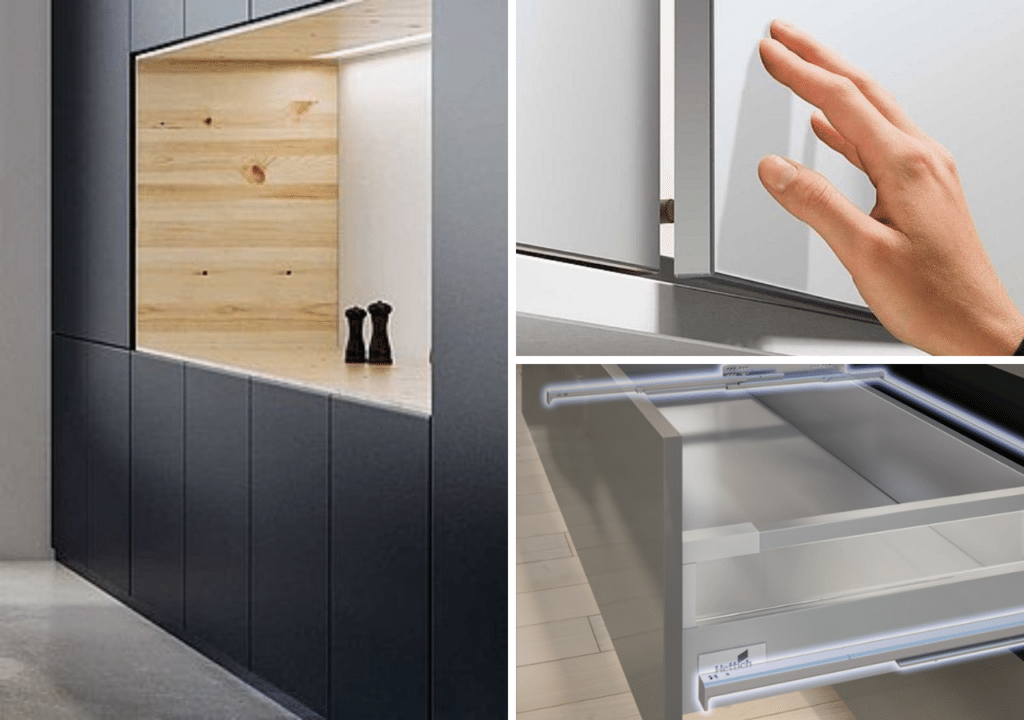
Push-to-open mechanisms are a popular choice for handleless cabinets, which can be installed directly in the cabinet housing or on the inside of the cabinet, completely hidden behind the door.
These systems use a spring or magnetic catch that allows you to open kitchen cabinets and drawers by simply pressing on them. In other words, a slight pressure on the door will gently open it, and the drawer will slide slightly outwards.
Blum push-to-open makes some nice push-release slides that eliminate the need for handles and keep your door gaps tight.
6. Electric-Driven System
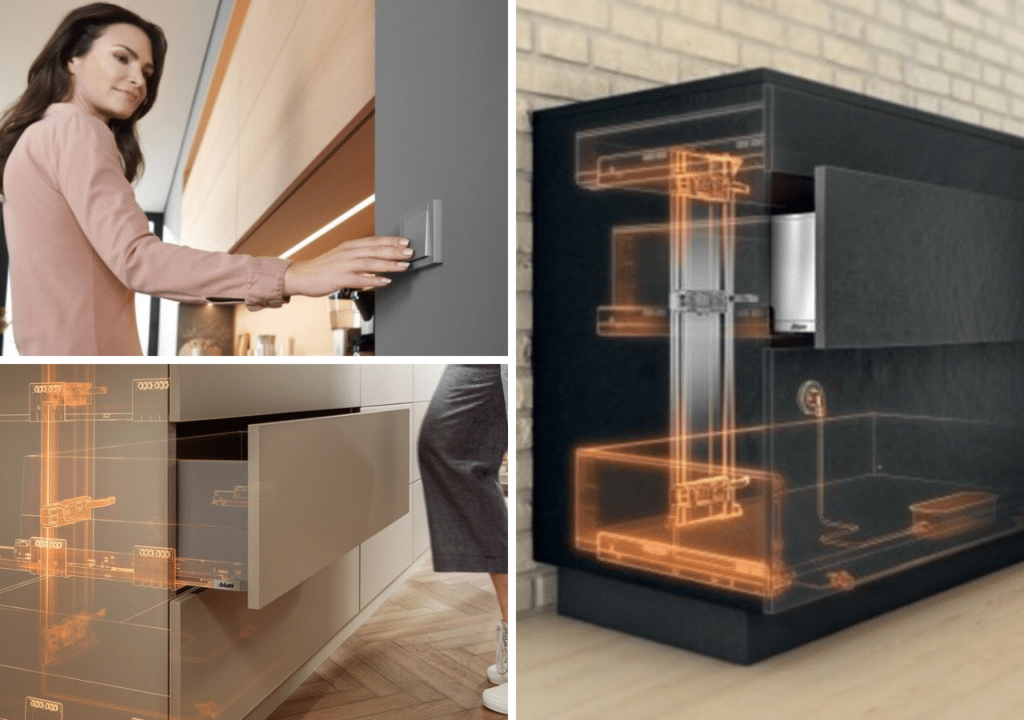
For those looking for a more high-end solution for a luxury kitchen with smart technology integration, electric-driven systems can be a great option.
An electric-driven system opens a cabinet with slight pressure or a wave of your hand, which can also include automated closing. This handleless system consists of a computer-driven touch-to-open motorized mechanism typically managed by sensors, buttons, or remote controls.
Professional installation is required for this high-tech handleless cabinet door mechanism to prevent incorrect setup or electrical problems, as motorized hardware needs to be integrated into the existing cabinets.
Handleless Kitchen Design Tips for Homeowners
If you decide to go for kitchen units without handles, consider these design tips to maximize their impact.
1. Coordinate with appliances
Select cabinet finishes and colors that complement your kitchen appliances for a cohesive look.
2. Mix textures
Add texture through woodgrain finishes or textured laminates to soften the starkness. Combine matte handleless door mechanisms with glossy surfaces or layer wood with sleek metals to add depth.
3. Lighting matters
Lighting can further highlight the handleless design. Integrate lighting under wall cabinets or along Gola rail systems to enhance depth and functionality.
4. Consider ergonomics
The height and layout should ensure push-to-open or edge pulls are comfortable to use.
5. Use neutral colors
A neutral color palette helps create a cohesive modern look. Explore different neutral color options that perfectly complement your kitchen design.
6. Integrate smart storage solutions
Handleless kitchen design calls for smart storage solutions to maximize functionality and enhance aesthetics. A smart kitchen design incorporating a handleless cabinet design makes the space sophisticated, modern, and clean-looking.
Are Handleless Kitchen Cabinets Right for You
While handleless kitchen cabinets are visually appealing and trendy, they may not be ideal for every homeowner.
| Ideal for | Might not suit |
|---|---|
| Homeowners seeking a minimalist or modern aesthetic | Traditional or farmhouse-style kitchens |
| Small kitchens that benefit from reduced visual clutter | Households that prefer tactile hardware |
| Design-conscious renovations or luxury remodels | Busy kitchens where quick access is key |
Final Thoughts
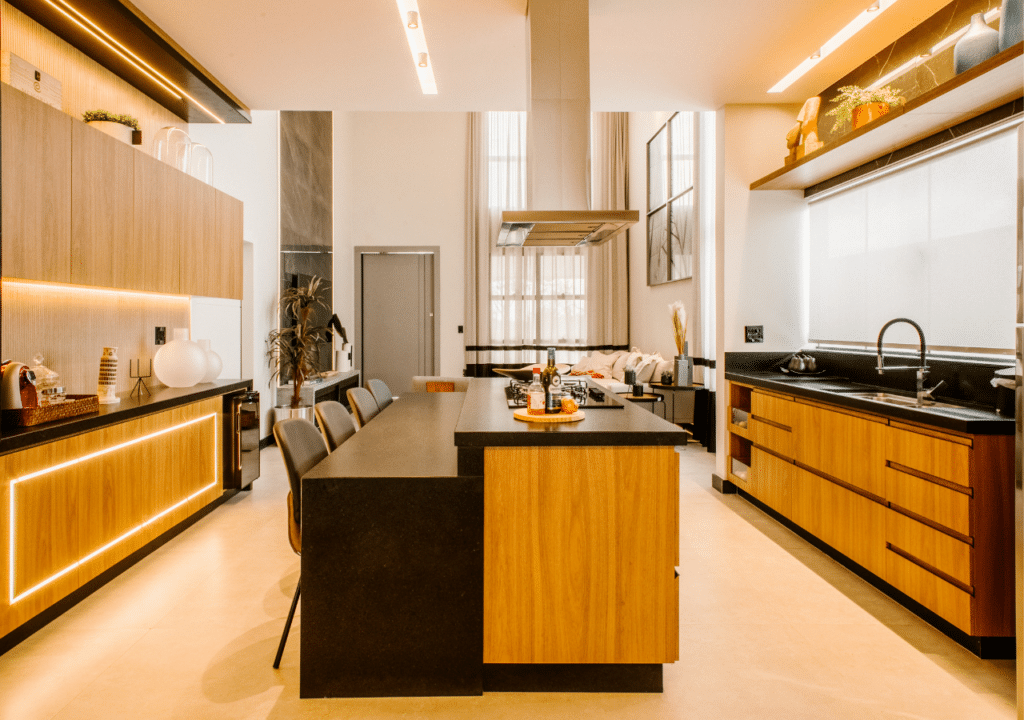
Handleless cabinets are best for homeowners seeking a stylish yet practical kitchen upgrade. They are an excellent choice for homeowners who prefer a minimalist, clutter-free kitchen design that emphasizes simplicity and modernity.
While they may come with a higher upfront cost and require thoughtful planning, the aesthetic and ergonomic benefits are hard to ignore.
Whether you opt for J-pull doors, push-to-open mechanisms, or the Gola handleless rail system, the handleless kitchen cabinets style can elevate your interior space into a sleek, contemporary masterpiece.
Upgrade Your Kitchen with Custom Handleless Cabinets
Planning to upgrade your kitchen? Best Online Cabinets (BOC) offers handleless kitchens as upgrades to our custom and semi-custom lines.
Consult with BOC to discover the best materials, finishes, and types of handleless kitchen doors perfect for your space. Contact our sales team now to get started with your kitchen upgrade.

